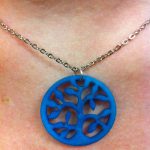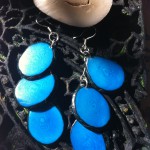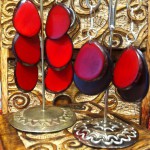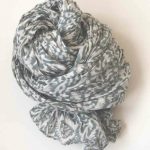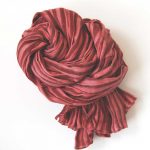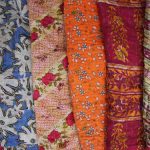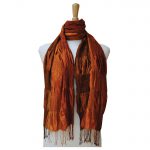 The following piece is part of our ‘Women Around the World Inspiring Change’ blog series that will run until Mother’s Day 2014.
The following piece is part of our ‘Women Around the World Inspiring Change’ blog series that will run until Mother’s Day 2014.
So far, we have featured a women’s group in Nogales, Mexico Hogar de Esperanza y Paz/Home of Hope and Peace (HEPAC), María Estela Barco Huerta, an incredible leader of DESMI (Desarrollo Económico Social de los Mexicanos Indígenas), and a partnership between the Fair Trade company, Equal Exchange, and women in the 10 primary societies of Gumutindo Coffee Co-op in Uganda.
Now, meet the women behind a Fair Trade tagua jewelry business in Bogota, Colombia.
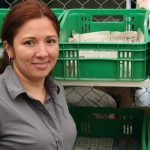
Tagua Seed Jewelry Artisan and Business Woman Lizzie Zuniga
Arriving from the airport into the Colombian capital city of Bogota, the main avenue is lined with the brilliant color of public art.
Every wall along Avenida Gaitan (named after the populist leader Jorge Eliecer Gaitan) tells a bold story of armed conflict and the resilience of the peoples’ movement for peace and justice. I was in Bogota to spend time with the artisans who produce the Global Exchange Fair Trade Store’s line of Fair Trade tagua seed jewelry. In one mural an indigenous woman, wrapped in the cloth of her cultural heritage, outstretches her hands to the cars rushing past. The word “Esperanza”, or “Hope”, is painted in neon behind her. The women artisans we have partnered with in Bogota are working for just that.

Tagua Seed Pod
Lizzie Zuniga moved to Bogota from Chiquinquira, a small town in the Western Boyaca Province located three hours north from the capital city. She and her partner Nicolas survived their first years in the city making and selling tagua seed jewelry in the street. Tagua seeds grow wild in Boyaca and when Lizzie and Nicolas moved to the city they depended on this natural resource of their homeland to sustain their new urban livelihood.
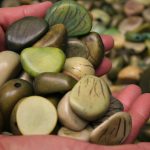
Whole Tagua seeds that have been died green
Tagua seeds grow in large pods on the trunk of Ivory Palms. The seeds remain gelatinous until the pod falls to the ground, where it can be peeled open to harvest the hard, smooth white seeds. Lizzie explains to me that the harvest cannot be rushed, as the resilience of the seeds depends on their full maturation. And so her business in Bogota grew, slowly and organically, with the tagua seed at its heart.
In her own words:
“Tagua is where I am from. It is part of my family and who I have become. On two different occasions when Nicolas and I had nothing, no shelter or food, we were able to rise and stand with tagua.”
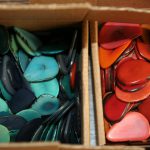
Tagua seeds thinly sliced, dyed and ready to be made into jewelry
Today Lizzie runs a sustainable ten-year old business that employs seven artisans in the full-time production of tagua jewelry. She has partnered with a friend from Chiquinquira, who transports the tagua harvested by local farmers during their off-season, to the city where is it sorted, peeled, tumbled smooth and sliced into slabs in her workshop.

Mother of three, expert dyer, and business woman Sandra Navarette
Sandra Navarrete has worked with Lizzie for four years in all stages of tagua jewelry production. She has developed a full knowledge of the trade and considers herself a master artisan and business woman.
In her own words she describes her position:
“I find purpose and possibility in my work. I am a mother to three daughters and I am very proud that I have developed the capacity and confidence to run a business. I know all the processes involved.”
She has chosen to work in the dying of the tagua slabs, a highly technical process in which eco-friendly dies are used to set brilliant reds, greens, and indigos. Sandra’s favorite color is purple, though the perfect red is the color she finds the most challenging to achieve.
The final product is a sustainably sourced, elegant piece of Fair Trade jewelry that can be sold to sustain a growing community of artisans that have relocated to Bogota from outside provinces. A large population of people, displaced from rural areas by decades of political violence in Colombia, lives in deep poverty on the outskirts of Bogota. The women of these communities are rising to create a future for their families through their work as artisans. In Lizzie’s case, she stays connected to the earth and her origins through the seeds that she works with. For her, tagua is a seed of hope or esperanza.
Stop in the Global Exchange Fair Trade Store in Berkeley this Mother’s Day to pick out your favorite from a wide selection of tagua jewelry pieces handmade with love by Lizzie and Sandra. My favorite is the Lizzie pendant, cut in the shape of a tree from a tagua seed, which comes in all colors.

You can make your Mama proud this Mother’s Day by gifting her a Fair Trade ‘Proud Mama’ gift box that includes the Lizzie pendant, along with a Putumayo “Women of the World” music CD, Fair Trade Equal Exchange chocolate bar, and a tin of Proud Mama coffee from Equal Exchange.
Get your Proud Mama Gift Box today!








